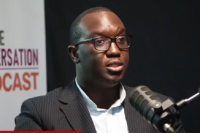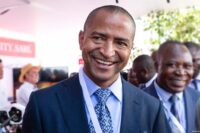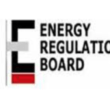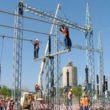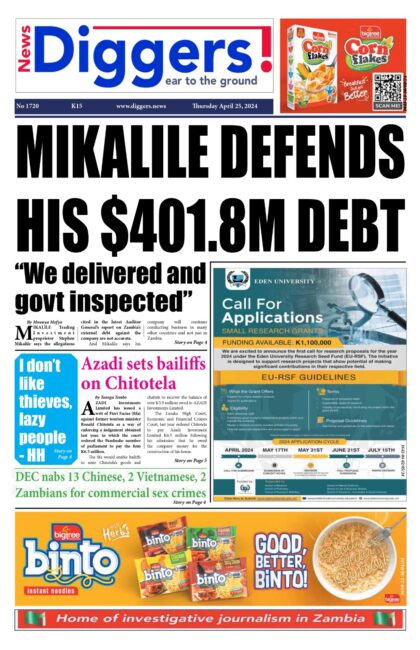We are not being greedy by proposing to hike electricity tariffs, but we need to cover our operational costs, says Zesco Limited’s director for strategy and corporate services Patrick Mwila.
And Zesco managing director Victor Mundende has disclosed that the power utility’s tariff increment proposal, an average 91 per cent hike, is targeted to be implemented in one single phase.
Meanwhile, data availed by Zesco reveals that the power utility hopes to generate over K16 billion revenue within the first full year of implementing the controversial tariffs.
Zesco proposes to increase retail tariffs by an average of 91 per cent in 2019 rising from an average of K0.77/kWh to K1.47/kWh.
This increase will ensure that all tariffs move to cost reflectivity for the year 2019.
Customers in the services category will face the largest increase at 134 per cent, followed by residential and commercial customers with increases of 101 per cent and 95 per cent, respectively.
But speaking during a press briefing in Lusaka, Wednesday, Mwila told journalists that Zesco was not being greedy in wanting to hike the power tariffs, justifying the huge tariff increment as helping the utility to cushion its escalating operational costs.
An analysis of regional tariffs within the SADC region indicates that Zambia is the second lowest with an average tariff of about 6.5 US cents per kWh, according to Zesco presentation availed to the media.
Zesco’s total operating costs rapidly climbed to K13.46 billion last year from K2.1 billion in 2011 to due to an increase in both cost of sales and other operating costs over the period.
It is, therefore, envisaged that this tariff increase would only be pushing the utility to within acceptable/cost reflective tariffs that are already being charged in the region.
“There are many factors which are informing this tariff review; it is something we must do for our nation, we must do for ourselves and we are not being greedy at all! This is a matter we are bringing to your attention that if we don’t do this right now, the consequences for you and I, even for our grandchildren, will be much worse! So, it is something we must do now,” Mwila argued.
Responding to questions relating to why the utility was adamant to implement the hiked tariff despite the suspension of the Cost of Service study, he explained that the process of having cost reflective tariffs in Zambia was critically important.
“Just a quick one on the Cost of Service Study; somebody mentioned ‘last time we did a review, we said we’d wait for the Cost of Service Study.’ It is clear that when were making that pronouncement, the Cost of Service Study was supposed to have been concluded by the end of last year, 2018. As we are speaking now, this matter is out of our hands; we hear that some consultation is going on about some recruitment of a consultant to oversee that Study, and as we mentioned, the nation cannot wait! If we did that, perhaps you would even say we are being irresponsible!” he said.
“…Because as you noticed from the presentation, the economic indicators are not waiting! And may I remind you that there are other issues, which we are not even dwelling on: in 2015 to 2016, we had a major power deficit, which required emergency power imports. There were costs, which were accrued during that period, which were not passed onto the customer.”
Mwila further justified the urgent need to implement the tariff increment.
“We’re a developing nation; we are increasing the number of districts every other year; we are also expanding the system. Now, who is going to serve the new people of Chitambo? We need people, we need resources. So, Zesco is not a static business; at every moment, we are looking at the needs of the economy and we must expand, hopefully, to meet those requirements. But we are doing it carefully because we are also cognizant of those sentiments. So, as far as we are concerned right now, we have stayed within industrial standards and we are more than meeting them,” Mwila explained.
And in response to further questions, Mundende revealed that the power utility’s tariff increment was designed to be implemented in one single phase.
“Is it going to be phased…? I think my understanding is that, this proposal, we’d like it to be one-off; if it’s possible, one-off. But again, this is not a decision of Zesco; we’ve applied to the ERB (Energy Regulation Board) with a proposal; the ERB in their own wisdom, in their own analysis, will come up with a decision, which decision by now, we don’t know,” replied Mundende.
Meanwhile, Zesco’s data showed that the power utility hoped to generate over K16 billion within the first full year of implementing the controversial tariffs.
“The adjustment is expected to generate revenue of up to ZMW16,061 million in the first full year of its implementation that will enable the company to fulfil its Key Performance Indicators, and implement its capital investment portfolio,” read Mundende’s presentation.




